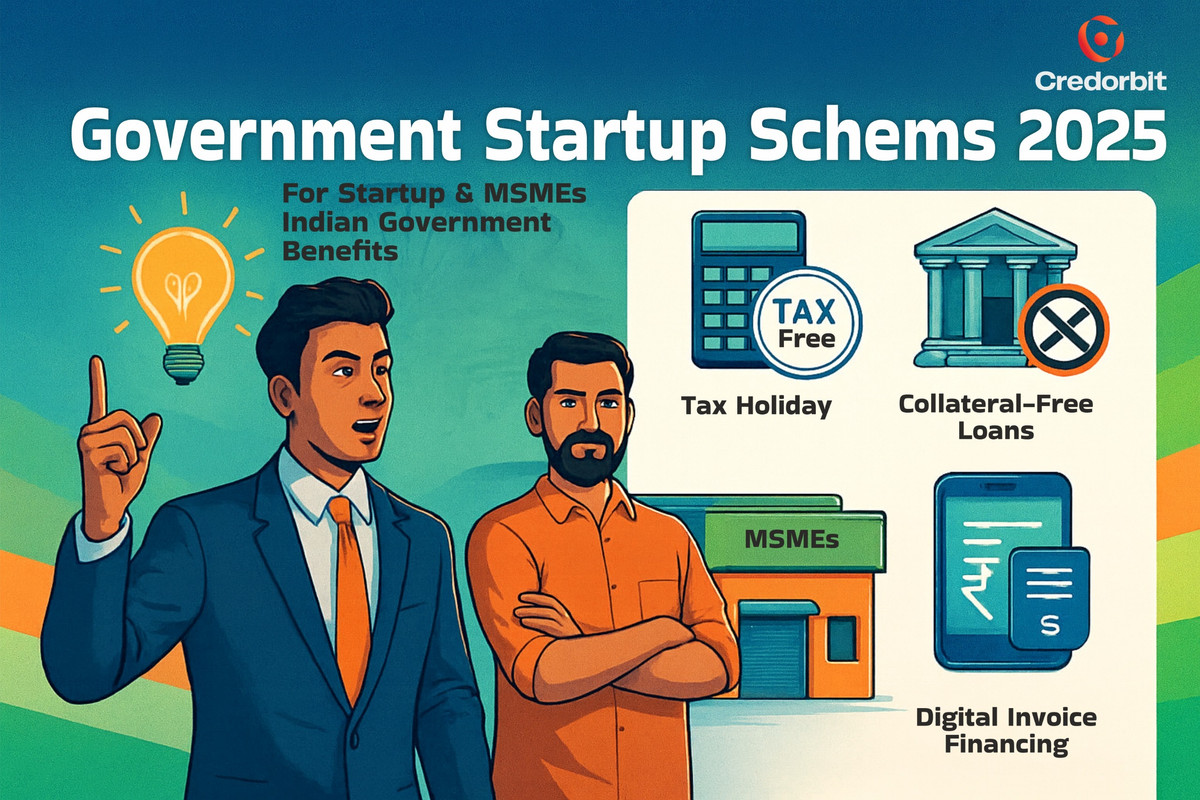Startup & MSME Schemes 2025: Complete Eligibility & Funding Guide
In 2025, India isn’t just talking about entrepreneurship — it’s living it. With over 1.2 lakh DPIIT-recognized startups and 1.5 crore+ MSMEs registered on the Udyam portal, the country has become a global powerhouse of innovation across fintech, agritech, AI, and manufacturing.
But here’s the real game-changer: this massive growth isn’t happening on innovation alone. Behind the scenes, the Government of India is pumping in unprecedented support — from 3-year tax holidays and ₹20 crore collateral-free loans to ₹50 lakh seed grants and 35% subsidies.
Imagine this:
- A startup founder securing a tax holiday under Section 80-IAC while raising ₹50 lakh in seed funding.
- A small business owner getting ₹10 crore collateral-free under CGTMSE or solving delayed payments instantly via TReDS invoice financing.
These aren’t just schemes on paper — they’re real opportunities that can decide whether your business stagnates or scales exponentially.
Quick Funding Checklist: Where Do You Fit?
- Startups (<10 years, DPIIT-recognized): Eligible for tax breaks under 80-IAC and collateral-free loans via CGSS.
- MSMEs (Udyam registered): Eligible for CGTMSE loans, subsidies under PMEGP, and RAMP/ZED support.
- Businesses selling to corporates/government: Use invoice financing via TReDS or GeM Sahay.
The 12 Best Startup & MSME Schemes in 2025
1. For Startups
- 80-IAC Tax Holiday – 3-year income tax exemption on profits for DPIIT-recognized startups (under 10 years).
- Startup India Seed Fund (SISFS) – Grants of ₹10–50 lakh via incubators for product development & prototype testing.
- Credit Guarantee Scheme for Startups (CGSS) – Collateral-free loans up to ₹20 crore from partner banks.
- Fund of Funds for Startups (FFS) – Govt. invests in VC funds to channel private investment.
2. For MSMEs
- CGTMSE – Collateral-free loans up to ₹10 crore for Udyam-registered MSMEs.
- PMEGP – 15–35% subsidy + bank loan for new businesses in manufacturing & services.
- MUDRA Scheme – Loans ₹50,000–₹20 lakh (Shishu, Kishor, Tarun categories).
3. Inclusive Growth Schemes
- Stand-Up India – Loans ₹10 lakh–₹1 crore for women & SC/ST entrepreneurs.
- PM Vishwakarma – Loans up to ₹3 lakh @ 5% interest + toolkit & training for artisans.
4. Growth & Competitiveness
- RAMP Program – Digitalisation, capacity building & export-readiness for MSMEs.
- ZED Certification – Up to 80% subsidy for Zero Defect Zero Effect certification.
- TReDS & GeM Sahay – Invoice financing without collateral to solve delayed payments.
Choosing the Right Path
For Startups:
- Get DPIIT Recognition
- Apply for 80-IAC Tax Benefits
- Use SISFS for seed funds
- Secure loans under CGSS
- Scale with VC funds via FFS
For MSMEs:
- Register on Udyam
- Apply for CGTMSE Loans
- Use TReDS / GeM Sahay for working capital
- Boost quality with ZED Certification
For Micro-Businesses:
- Apply under PMEGP
- Take a MUDRA Loan
- Explore Stand-Up India (if women/SC/ST)
- Use PM Vishwakarma (if artisan)
Step-by-Step Tips for a Successful Application
- Documentation: PAN, Aadhaar, registration certificate, bank statements, project reports.
- Choose Wisely: Match scheme with stage & sector.
- Use Official Portals: Udyam, Startup India, TReDS, GeM Sahay, PMEGP.
- Advisory Support: For large loans, consult incubators or advisors.
- Leverage Multiple Schemes: Combine tax benefits + loans + subsidies for maximum impact.
Key Challenges Solved by These Schemes
- Capital Crunch: Collateral-free loans ease funding access.
- Delayed Payments: TReDS & GeM Sahay improve cash flow.
- Scaling Hurdles: Subsidies & seed funds boost growth.
- Inclusive Growth: Schemes empower women, SC/ST, and artisans.
- Quality & Competitiveness: ZED & RAMP push global standards.
Conclusion
India’s startup and MSME ecosystem in 2025 offers unmatched opportunities — from tax exemptions and collateral-free loans to inclusive support for micro, women-led, and artisan businesses. By selecting the right scheme, preparing documents, and leveraging multiple benefits, entrepreneurs can unlock capital, scale faster, and compete globally.
FAQs
Q1: Do these schemes really offer loans without collateral?
Yes. CGTMSE, CGSS, and MUDRA provide collateral-free loans (subject to eligibility).
Q2: How can I register as an MSME?
Register free on the Udyam portal using Aadhaar & PAN.
Q3: Which scheme is best for a new small business?
PMEGP is great for subsidies, while MUDRA loans provide quick working capital.
Q4: Are there special schemes for women entrepreneurs?
Yes. Stand-Up India, MUDRA, and others target women-led businesses.
Q5: How do I know which scheme I am eligible for?
It depends on your registration (DPIIT/Udyam), years of operation, sector, and business type. Always check official guidelines.


